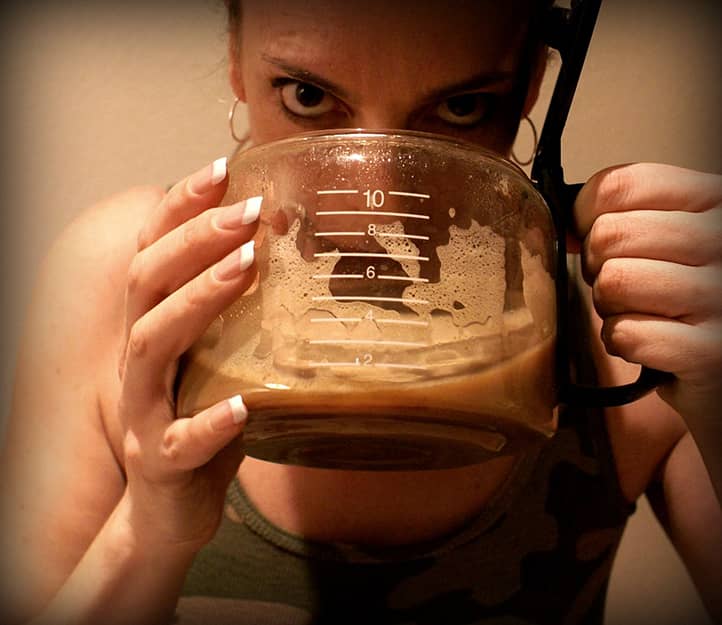In today’s world, where the pace of life is constantly accelerating and stress has become an inseparable part of daily life, people increasingly turn to various methods to maintain their psychological well-being. Among the many methods, coffee holds a special place—a drink that has long ceased to be just a source of caffeine. For millions of people worldwide, coffee has become a ritual that not only provides physical energy but also significantly enhances psychological well-being.
Coffee is one of the most popular drinks globally, with over 2 billion cups consumed daily, making it an integral part of many countries’ cultures. However, attitudes toward coffee have changed significantly over the past few decades. Whereas it was once valued mainly for its ability to quickly invigorate and boost productivity, today, increasing attention is given to its impact on a person’s psychological state.

The Scientific Basis of Coffee’s Effects on the Body
Caffeine, the primary active ingredient in coffee, has a significant impact on the central nervous system. When it enters the body, it blocks adenosine receptors—a neurotransmitter responsible for feelings of fatigue. This leads to increased neuron activity and the release of other neurotransmitters, such as dopamine and norepinephrine.
Studies show that moderate caffeine consumption can improve mood, increase alertness, and enhance cognitive functions. According to data published in the journal Psychopharmacology, even a small amount of caffeine (about 75 mg, equivalent to one cup of coffee) can lift one’s mood and improve focus.
Antioxidants in Coffee and Their Benefits
Coffee is a rich source of antioxidants, especially polyphenols. These compounds play an essential role in protecting cells from oxidative stress, which can lead to the development of various diseases, including depression and anxiety.
A study published in the Journal of Agricultural and Food Chemistry showed that coffee is one of the primary sources of antioxidants in the diet for many people, especially in Western countries. Regular consumption of coffee helps reduce the risk of neurodegenerative diseases, such as Alzheimer’s and Parkinson’s disease, which indirectly contributes to psychological well-being.
Impact on Dopamine and Serotonin Levels
Caffeine stimulates dopamine production—a neurotransmitter associated with pleasure and motivation. This explains why many people feel a mood boost after a cup of coffee.
Moreover, some studies suggest that regular coffee consumption may affect serotonin levels—a neurotransmitter that plays a key role in mood regulation. Although the mechanism of this influence is not fully understood, it is believed that coffee enhances serotonin receptor sensitivity, which could potentially help in preventing depression.

The Ritual of Coffee Preparation
Rituals play an important role in our lives, creating a sense of order, predictability, and control. Psychologists note that daily rituals can reduce levels of anxiety and stress by creating a kind of “anchor” in an unstable world.
For many, coffee preparation has become exactly such a ritual. Whether you use a complex coffee machine or a simple pot, the process itself becomes a moment of calm and focus amid the hustle and bustle of daily life.
Stages of Coffee Preparation as a Meditative Practice
The process of making coffee can be seen as a kind of meditation. Each step—from choosing the beans to pouring the finished drink into a cup—requires attention and focus. This allows one to temporarily escape from problems and concentrate on the present moment.
For example, when using the pour-over method (brewing coffee through a filter), it’s necessary to slowly and evenly pour hot water in circular motions. This process requires attention and can serve as a great concentration exercise.
The Influence of Expectation on Taste and Effect Perception
Interestingly, the anticipation of coffee itself can affect our psychological state. Research in neurogastronomy shows that anticipating a favorite drink activates pleasure centers in the brain even before taking the first sip.
Moreover, our expectations can influence how we perceive the taste and effect of coffee. Experiments show that people expecting a stimulating effect from coffee often feel more energetic even after drinking decaffeinated coffee. This demonstrates the psychological power of the coffee ritual.

The Social Aspect of Coffee Consumption
Cafés have long been an essential part of urban culture and a significant place for social interaction. They provide a space for communication, work, and relaxation, fostering social connections and the exchange of ideas.
Research shows that regularly visiting cafés has a positive effect on psychological well-being, especially for people who are lonely or work remotely. The atmosphere of a café, filled with pleasant aromas and quiet conversations, creates a sense of community, even if one visits alone.
“Coffee Breaks” at Work and Their Role in Communication
In corporate culture, coffee breaks play a special role. They not only allow employees to take a break and recharge but also foster informal communication between colleagues. This improves the working atmosphere, increases creativity, and even enhances productivity.
A study conducted by MIT found that employees who drank coffee together showed higher levels of cooperation and idea exchange. Such informal interactions help reduce stress and increase job satisfaction.
Cultural Traditions Related to Coffee
Coffee plays an important role in the cultural traditions of many countries. For example, in Italy, espresso is not just a drink but a part of national identity. The quick ritual of having espresso at the bar counter is a moment of pause and enjoyment amidst the day’s rush.
In Ethiopian culture, the coffee ceremony can last for hours and is an important social ritual. Taking part in such traditions gives a sense of belonging and cultural identity, which positively influences psychological well-being.

Coffee as a Tool for Boosting Productivity
The caffeine in coffee is known for its ability to improve concentration. Studies show that moderate coffee consumption enhances cognitive functions, especially in situations requiring prolonged focus.
According to research published in the journal Psychopharmacology, caffeine improves performance in tasks requiring sustained attention. This is particularly useful for people in certain professions, such as long-haul drivers or data-processing specialists.
Coffee as a Trigger to Start the Workday
For many, the morning cup of coffee serves as a signal to start the workday. This ritual helps set a productive mood and creates a boundary between rest and work.
Psychologists note that having a clear “trigger” for beginning the work process significantly enhances productivity. Coffee, in this sense, serves as not only a physical stimulant but also a psychological anchor, helping one enter work mode.
Balancing Stimulation and Overstimulation
It is essential to remember that coffee’s effect on productivity has its limits. Excessive consumption can lead to overstimulation, anxiety, and even reduced performance.
Studies show that the optimal caffeine level for boosting cognitive functions varies from person to person and depends on factors such as genetics, body weight, and caffeine tolerance. Finding the optimal amount that provides alertness without negative side effects is essential.

Psychological Effects of the Coffee Aroma
The aroma of coffee can have a powerful psychological effect due to the close connection between smell and emotional memory. Scents are processed in the same part of the brain responsible for emotions and memory—the limbic system.
Studies show that the aroma of coffee can evoke strong emotional reactions and memories. For many, the smell of freshly brewed coffee is associated with pleasant moments—cozy mornings, meetings with friends, or productive work sessions. These positive associations improve mood and reduce stress.
Calming Effect of the Aroma
Despite caffeine’s stimulating effect, the aroma of coffee can have a calming effect. A study conducted at Seoul National University showed that stressed rats exhibited changes in gene expression and brain activity related to stress reduction when exposed to coffee aroma.
This explains why many people, even those who don’t consume caffeine, enjoy the smell of coffee. The aroma itself can evoke a sense of comfort and calmness.
Using Coffee Aroma in Aromatherapy
Given the potential calming properties of coffee aroma, it has begun to be used in aromatherapy. Some aromatherapists recommend using coffee essential oil or coffee-scented candles to relieve stress and enhance focus.
Although scientific studies in this area are still limited, many people report that the smell of coffee helps them feel more focused and motivated. This is especially useful for those working from home and wanting to create an environment conducive to productivity.

Potential Risks and How to Avoid Them
Despite the many positive effects, regular coffee consumption can lead to caffeine dependency. Although it’s relatively mild compared to other substances, caffeine dependency may cause unpleasant withdrawal symptoms, such as headaches, irritability, and fatigue.
To avoid developing a dependency, it is recommended to:
- Limit coffee intake to 3-4 cups per day (no more than 400 mg of caffeine).
- Periodically take “coffee breaks” – days or weeks without caffeine.
- Gradually reduce coffee consumption if you decide to quit.
Impact on Sleep Quality
Caffeine can significantly affect sleep quality, especially when consumed later in the day. Sleep disruptions, in turn, can negatively impact mental well-being, causing irritability, decreased concentration, and even symptoms of depression.
To minimize the negative impact on sleep, it is recommended to:
- Avoid coffee after 2:00 PM or within six hours of bedtime.
- Track your personal response to caffeine and adjust your last coffee intake time accordingly.
- Consider switching to decaffeinated coffee in the afternoon.
Individual Sensitivity and Consumption Recommendations
It’s important to remember that reactions to caffeine vary greatly among individuals. Some people experience increased anxiety, rapid heartbeat, or trembling even from a small amount of coffee, while others consume large amounts without noticeable adverse effects.
For determining the optimal coffee consumption routine, it is recommended to:
- Start with small doses and gradually increase, monitoring your reaction.
- Pay attention to the time of day when coffee has the most beneficial effects.
- Experiment with different brewing methods, as caffeine content can vary depending on the method.
- Consult a doctor if you have chronic illnesses or take medications that may interact with caffeine.

Conclusion
In conclusion, it’s safe to say that coffee plays a significant role in enhancing the mental well-being of many people. From scientifically proven effects on cognitive function to cultural rituals and social interactions, coffee offers numerous ways to uplift mood and overall well-being.
However, it’s essential to be mindful of potential risks and approach coffee consumption responsibly. By finding a balance between its positive effects and possible negative consequences, everyone can create their own “energy ritual” that not only brings pleasure but also improves mental comfort.
Ultimately, coffee is not just a beverage; it’s a multifaceted cultural phenomenon that enriches our lives on many levels. A mindful approach to its consumption is a valuable tool in managing mood, productivity, and overall well-being.
Whether it’s a morning ritual, a meeting with friends at a café, or a quiet moment with a favorite cup, coffee continues to play an important role in the lives of millions of people worldwide. And while we continue to explore its impact on health and psychology, one thing remains constant – coffee’s ability to bring moments of joy into our daily lives.




